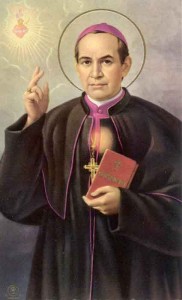Faith and Reason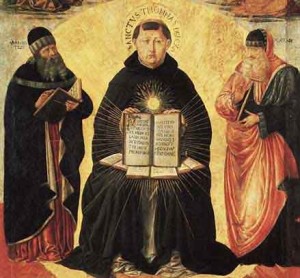
[powerpress]
“Come let us reason together, says the Lord†– Isaiah 1:18.
Many in our day strictly divide faith and reason, seeing science as based on logic and objective truth, but religion as solely emotional and subjective.
Not so, says the Catholic Church. Faith and reason complement and assist one another in the pursuit of truth. All truth is God’s truth and ultimately leads to Him who is Truth itself, Jesus Christ, so there is nothing to fear from scientific inquiry.
In fact, for centuries the Catholic Church was the patron of the arts and sciences. St. Thomas Aquinas used Greek philosophy to show the logical foundation of the Catholic Faith, many of the great scientific discoveries have been made by Catholic priests or scientists, convinced that the universe operated by fixed laws established by the one true God, not the mere whims of the gods as the pagans had previously believed.
Of course, faith is a gift and is not based on reason alone. Nevertheless, as Sir Thomas More says in the classic film A Man For All Seasons, “God made the angels to show His splendor, the animals for their innocence, and the plants for simplicity, but God made man to serve him wittily in the tangle of His mind.â€
Tags: catholic, catholic podcast, catholic prayer, cathollc spirituality, faith and reason, Faith and Reason Faith, jesus christ, thomas aquinas
This entry was posted on Monday, January 16th, 2012 at 8:16 am
You can follow any responses to this entry through the RSS 2.0 feed.
.
 see also Pope Benedict’s teachings on St. Gertrude on the Discerning Hearts Holy Women page
see also Pope Benedict’s teachings on St. Gertrude on the Discerning Hearts Holy Women page
(1256-1302 A.D.) Few men have merited the title, “the Great”; fewer women. I know of only one nun so honored, St. Gertrude of Helfta, a mystic whose spiritual writings have remained influential up to the present.
Nothing is known of this German woman’s family background. When five years old, she was entrusted to the sisters of Helfta Abbey to be educated. From a very young age she gave evidence of her brilliance and quickly outstripped her companions. In her teen years she asked to join the community. Therefore, she probably spent her whole life from childhood on within the abbey walls.
Her love for secular studies made the common life wearisome, pride and vanity ate away at her soul and she soon became an unhappy young woman until Christ appeared to her. The day was branded in her memory, it was in her 26th year, when as she says “in a happy hour, at the beginning of twilight, thou O God of truth, more radiant than any light, yet deeper than any secret thing, determined to dissolve the obscurity of my darkness.” From then on her biographer tells us “she became a theologian instead of a grammarian.” She did not give up her intellectual ardor but now, all her labors were for her sisters, to cure what she termed “the wound of ignorance”. Her many gifts and mystical graces did not prevent her from giving herself wholeheartedly to the common life with its joys and sorrows. In fact many of her special graces came to her as she took part in the ordinary routine of convent life. She felt keenly for those whose burdens involved them in distracting duties, for example those responsible for meeting the debts of the monastery.
She prayed that they might have more time to pray and fewer distractions. The Lord’s answered “It does not matter to me whether you perform spiritual exercises or manual labor, provided only that your will is directed to me with a right intention. If I took pleasure only in your spiritual exercises, I should certainly have reformed human nature after Adam’s fall so that it would not need food, clothing or the other things that man must find or make with such effort.”
Many of her writings are lost, but fortunately she left to the world an abundance of spiritual joy in her book The Herald of Divine Love, in which she tells of the visions granted her by our divine Lord. She wrote this excellent, small book because she was told that nothing was given to her for her own sake only. Her Exercises is an excellent treatise on the renewal of baptismal vows, spiritual conversion, religious vows, love, praise, gratitude to God, reparation, and preparation for death.
She began to record her supernatural and mystical experiences in what eventually became her Book of Extraordinary Grace (Revelation of Saint Gertrude), together with Mechtilde’s mystical experiences Liber Specialis Gratiae, which Gertrude recorded. Most of the book was actually written by others based on Gertrude’s notes. She also wrote with or for Saint Mechtilde a series of prayers that became very popular, and through her writings helped spread devotion to the Sacred Heart (though it was not so called until revealed to St. Margaret Mary Alocoque).
Gertrude is inseparably associated with the devotion to the Sacred Heart. The pierced hear
t of Jesus embodied for her the Divine Love, an inexhaustible fountain of redemptive life. Her visions and insights in connection with the Heart of Jesus are very enlightening. In one such intellectual vision, she perceived the unceasing love of Christ for us in two pulsations of his Heart – one accomplished the conversion of sinners, the other the sanctification of the just. Just as our own faithful heart keeps right on whether we advert to it or not, these pulsations will endure till the end of time despite the vicissitudes of history.
Our Lord wishes people to pray for the souls in purgatory. He once showed Gertrude a table of gold on which were many costly pearls. The pearls were prayers for the holy souls. At the same time the saint had a vision of souls freed from suffering and ascending in the form of bright sparks to heaven.
In one Vision, Our Lord tells Gertrude that he longs for someone to ask Him to release souls from purgatory, just as a king who imprisons a friend for justice’s sake hopes that someone will beg for mercy for his friend. Jesus ends with:
“I accept with highest pleasure what is offered to Me for the poor souls, for I long inexpressibly to have near Me those for whom I paid so great a price. By the prayers of thy loving soul, I am induced to free a prisoner from purgatory as often as thou dost move thy tongue to utter a word of prayer.” (more…)
Tags: benedictine, catholic, catholic podcast, catholic prayer, cathollc spirituality, devotion, family, jesus christ, love, mystic of the Church, mystical experiences, sacred heart, sacred heart of jesus, spiritual exercises, spiritual writings, st gertrude, women of the middle ages
This entry was posted on Wednesday, November 16th, 2011 at 2:30 am
You can follow any responses to this entry through the RSS 2.0 feed.
‘The love of Christ arouses us, urges us to run, and to fly lifted on the wings of holy zeal . . . The man who burns with the fire of divine love is a son of the Immaculate Heart of Mary, and wherever he goes, he enkindles that flame; he desires and works with all his strength to inflame all men with the fire of God’s love. Nothing deters him: he rejoices in poverty; he labors strenuously; he welcomes hardships; he laughs off false accusations; he rejoices in anguish. He thinks only of how he might follow Jesus Christ and imitate Him by his prayers, his labors, his sufferings, and by caring always and only for the glory of God and the salvation of souls.’ – St. Anthony Mary Claret
A remarkable saint…St. Anthony Mary Claret who lived during the turblent years of the 1800’s in Latin America, namely Cuba. He had a great love for the Blessed Virgin Mary and her Immaculate Heart. More on his life can be found here…
Tags: anthony mary claret, blessed virgin mary, catholic, catholic podcast, catholic prayer, cathollc spirituality, Church, immaculate heart of mary, jesus christ, latin america, love, St. Anthony Mary, St. Anthony Mary Claret, sufferings
This entry was posted on Monday, October 24th, 2011 at 12:52 am
You can follow any responses to this entry through the RSS 2.0 feed.
The Novena to St. Teresa of Avila, Day 6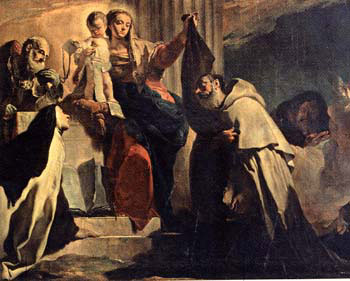
composed by  by St. Alphonsus of Liguori.
Join in on Day 6 [powerpress = “devotionals-prayers”]
O most bountiful Lord Jesus Christ! we thank Thee for the gift of devotion towards Thy sweet mother, Mary and her holy spouse, Joseph, which Thou didst grant to Thy beloved Teresa; we pray Thee, by Thy merits, and by those of Thy most dear spouse, to give us the grace of a special and tender devotion towards Thy most holy mother, Mary, and towards Thy beloved foster-father, Joseph.
Say one Our Father, Hail Mary and Glory be.
V. St. Teresa, pray for us:
R. That we may become worthy of the promises of Jesus Christ.
Let us pray: Graciously hear us, O God of our salvation! that as we rejoice in the commemoration of the blessed virgin Teresa, so we may be nourished by her heavenly doctrine, and draw from thence the fervour of a tender devotion; through our Lord Jesus Christ, Thy Son, Who liveth and reigneth with Thee in the unity of the Holy Spirit, God for ever and ever. Amen
Tags: catholic, catholic podcast, catholic prayer, cathollc spirituality, hail mary, jesus christ, Lord Jesus Christ, st teresa
This entry was posted on Wednesday, October 12th, 2011 at 12:04 am
You can follow any responses to this entry through the RSS 2.0 feed.
“Flesh and blood has not revealed this to you, but my Father who is in heaven”
[powerpress=”daily-scripture”]
an excerpt from today’s reflection by Don Schwager:
Who is Jesus for you? At an opportune time Jesus tests his disciples with a crucial question: Who do men say that I am and who do you say that I am? He was widely recognized in Israel as a mighty man of God, even being compared with the greatest of the prophets, John the Baptist, Elijah, and Jeremiah. Peter, always quick to respond, exclaimed that he was the Christ, the Son of the living God. No mortal being could have revealed this to Peter; but only God. Jesus then confers on Peter authority to govern the church that Jesus would build, a church that no powers would overcome.
Jesus plays on Peter’s name which is the same word for “rock” in both Aramaic and Greek. To call someone a “rock” is one of the greatest of compliments. The ancient rabbis had a saying that when God saw Abraham, he exclaimed: “I have discovered a rock to found the world upon”. Through Abraham God established a nation for himself. Through faith Peter grasped who Jesus truly was. He was the first apostle to recognize Jesus as theAnointed One (Messiah and Christ) and the only begotten Son of God. The New T estament describes the church as a spiritual house or temple with each member joined together as living stones (see 1 Peter 2:5). Faith in Jesus Christ makes us into rocks or spiritual stones. The Lord Jesus tests each of us personally with the same question: Who do you say that I am?
estament describes the church as a spiritual house or temple with each member joined together as living stones (see 1 Peter 2:5). Faith in Jesus Christ makes us into rocks or spiritual stones. The Lord Jesus tests each of us personally with the same question: Who do you say that I am?
When Jesus told his disciples that he must suffer many things, be rejected by the religious authorities in Jerusalem, and then be put to death, he also prophesied that he would be raised on the third day. Peter, always quick to respond, rejected the notion that the Messiah must suffer and be killed. This wasn’t the kind of Messiah that Peter and the Jews expected. They didn’t understand that the prophet Isaiah, some 700 hundred years before Christ’s birth, foretold that God’s Anointed One would come as the Suffering Servant who would be despised, rejected, and put to death to atone for the sins of the world [see Isaiah 52:13-15; Isaiah 53:1-12] . Jesus saw in Peter’s rejection a temptation to avoid the way of the cross which involved obedience and trust in God’s will, and voluntary suffering and sacrifice for the sake of others. Jesus rebuked not only Peter but Satan, the greatest of angels who disobeyed and refused to serve his Lord and Creator. Are you ready to follow the Lord Jesus, to suffer and die for him, that you may also share in his glory and resurrection?
“Lord Jesus, I profess and believe that you are the Christ, the Son of the living God. Make my faith strong in temptation and adversity that I may follow you faithfully as my Lord and Savior.”
for the full reflection visit : Daily Reading and Meditation
Tags: catholic, catholic podcast, catholic prayer, cathollc spirituality, don schwager, gospel of matthew, jesus christ, Lord Jesus
This entry was posted on Thursday, August 4th, 2011 at 6:01 am
You can follow any responses to this entry through the RSS 2.0 feed.
“May they become perfectly one“
[powerpress feed=”daily-scripture”]
an excerpt from today’s reflection by Don Schwager:
Do you pray as Jesus did for the unity of all Christians? The distinctive mark of Jesus’disciples is their love and unity. “How good and delightful it is when brethren dwell together in unity†(Psalm 133:1). Jesus’ high priestly prayer at the last supper concludes with the petition for Christian unity among all who profess Jesus Christ as Lord. Jesus prays for all men and women who will come after him and follow him as his disciples. In a special way Jesus prays here for us that as members of his body the church we would be one as he and his Father is one. The unity of Jesus and his Father is a unity of love and obedience and a unity of personal relationship. Because Jesus loved us first and united us in baptism we are called to live in a unity of love. Jesus’ prayer on the eve of his sacrifice shows the great love and trust he has in his beloved disciples. He knows they would abandon him in his hour of trial, yet he entrusted to them the great task of spreading his name throughout the world and to the end of the ages. The Lord entrust us with the same mission – to make him known and loved by all. Jesus died and rose again that all might be one as he and the Father are one. Do you love and accept all baptized Christians as your brothers and sisters in Christ?
“Lord God, have mercy on your people and heal the divisions in the body of Christ. May all Christian people throughout the world attain the unity for which Jesus prayed on the eve of his sacrifice. Renew in us the power of the Spirit that we may be a sign of that unity and a means of its growth. Increase in us a fervent love for all our brothers and sisters in Christ.”
for the full reflection visit : Daily Reading and Meditation
Tags: catholic, catholic podcast, catholic prayer, cathollc spirituality, christian unity, don schwager, gospel of john, jesus christ, Jesus prays
This entry was posted on Thursday, June 9th, 2011 at 6:06 am
You can follow any responses to this entry through the RSS 2.0 feed.
O Lord,
Your Ascension into heaven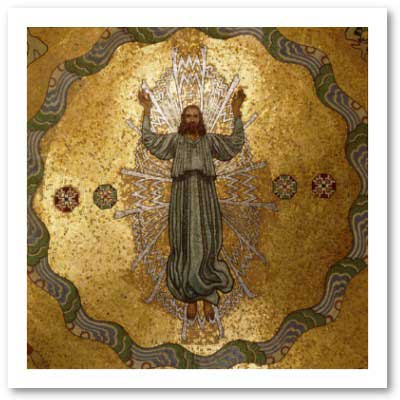
marks the culmination of the Paschal Mystery,
and it contains an important teaching for us.
May we live life as an earthly reality
and develop our human potential to the fullest.
May we make use of the results of science
to achieve a better life on this planet.
But in our best moments
we know that there must be more
than all of this,
a transcending Reality.
As Christians, we know that this Reality
is Your loving Father
Who awaits us with You and the Holy Spirit.
Where You have gone,
we ultimately will come – if we are faithful.
New Saint Joseph People’s Prayer Book
Tags: Ascension into heaven, Ascension of the Lord O Lord, catholic, catholic podcast, catholic prayer, cathollc spirituality, culmination, human potential, Jesus, jesus christ, paschal mystery, The Ascension
This entry was posted on Thursday, June 2nd, 2011 at 12:56 am
You can follow any responses to this entry through the RSS 2.0 feed.
“I am the bread of life; he who comes to me shall not hunger“
[powerpress feed=”daily-scripture”]
an excerpt from today’s reflection by Don Schwager: 
Do you hunger for the bread of life? The Jews had always regarded the mana in the wilderness as the bread of God (Psalm 78:24, Exodus 16:15). There was a strong Rabbinic belief that when the Messiah came he would give manna from heaven. This was the supreme work of Moses. Now the Jewish leaders were demanding that Jesus produce manna from heaven as proof to his claim to be the Messiah. Jesus responds by telling them that it was not Moses who gave the manna, but God. And the manna given to Moses and the people was not the real bread from heaven, but only a symbol of the bread to come.
Jesus then makes the claim which only God can make: I am the bread of life. The bread which Jesus offers is none else than the very life of God. This is the true bread which can truly satisfy the hunger in our hearts. The manna from heaven prefigured the superabundance of the unique bread of the Eucharist or Lord’s Supper which Jesus gave to his disciples on the eve of his sacrifice. The manna in the wilderness sustained the Israelites on their journey to the Promised Land. It could not produce eternal life for the Israelites. The bread which Jesus offers his disciples sustains us not only on our journey to the heavenly paradise, it gives us the abundant supernatural life of God which sustains us both now and for all eternity. When we receive from the Lord’s table we unite ourselves to Jesus Christ, who makes us sharers in his body and blood and partakers of his divine life. Ignatius of Antioch (35-107 A.D.) calls it the “one bread that provides the medicine of immortality, the antidote for death, and the food that makes us live for ever in Jesus Christ” (Ad Eph. 20,2). This supernatural food is healing for both body and soul and strength for our journey heavenward. Do you hunger for God and for the food which produces everlasting life?
“Lord Jesus Christ, you are the bread of life. You alone can satisfy the hunger in my heart. May I always find in you, the true bread from heaven, the source of life and nourishment I need to sustain me on my journey to the promised land of heaven.”
for the full reflection visit : Daily Reading and Meditation
Tags: catholic, catholic podcast, catholic prayer, cathollc spirituality, don schwager, gospel of john, jesus christ, manna from heaven
This entry was posted on Tuesday, May 10th, 2011 at 12:01 am
You can follow any responses to this entry through the RSS 2.0 feed.
The Feast of the Conversion of St. Paul – from the Gospel of Mark the full reading and reflection
“Go into all the world and preach the gospel to the whole creation”
an excerpt from today’s reflection by Don Schwager: 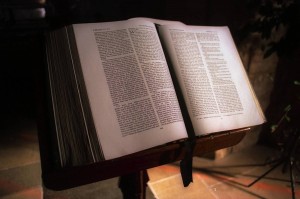
Mark ends his gospel account with Jesus’ last appearance to the apostles before his ascension into heaven. Jesus’ departure and ascension was both an end and a beginning for his disciples. While it was the end of Jesus’ physical presence with his beloved disciples, it marked the beginning of Jesus’ presence with them in a new way. Jesus promised that he would be with them always to the end of time. Now as the glorified and risen Lord and Savior, ascended to the right hand of the Father in heaven, Jesus promised to send them the Holy Spirit who would anoint them with power on the Feast of Pentecost, just as Jesus was anointed for his ministry at the River Jordan. When the Lord Jesus departed physically from the apostles, they were not left in sorrow or grief. Instead, they were filled with joy and with great anticipation for the coming of the Holy Spirit.
Jesus’ last words to his apostles point to his saving mission and to their mission to be witnesses of his saving death and his glorious resurrection and to proclaim the good news of salvation to all the world. Their task is to proclaim the good news of 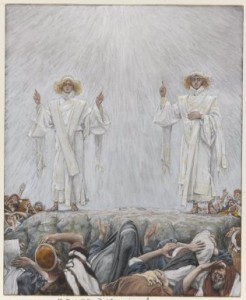 salvation, not only to the people of Israel, but to all the nations. God’s love and gift of salvation is not just for a few, or for a nation, but it is for the whole world – for all who will accept it. The gospel is the power of God, the power to forgive sins, to heal, to deliver from evil and oppression, and to restore life. Do you believe in the power of the gospel?
salvation, not only to the people of Israel, but to all the nations. God’s love and gift of salvation is not just for a few, or for a nation, but it is for the whole world – for all who will accept it. The gospel is the power of God, the power to forgive sins, to heal, to deliver from evil and oppression, and to restore life. Do you believe in the power of the gospel?
This is the great commission which the risen Christ gives to the whole church. All believers have been given a share in this task – to be heralds of the good news and ambassadors for Jesus Christ, the only savior of the world. We have not been left alone in this task, for the risen Lord works in and through us by the power of his Holy Spirit. Today we witness a new Pentecost as the Lord pours out his Holy Spirit upon his people to renew and strengthen the body of Christ and to equip it for effective ministry and mission to every land and peoples. Do you witness to others the joy of the gospel and the hope of the resurrection?
“Lord Jesus, through the gift of your Holy Spirit, you fill us with an indomitable spirit of praise and joy which no earthly trial can subdue. Fill me with your resurrection joy and help me to live a life of praise and thanksgiving for your glory. May I witness to those around me the joy of the gospel and the reality of your resurrection.â€
for the full reflection visit : Daily Reading and Meditation
Tags: ascension, catholic, catholic podcast, catholic prayer, cathollc spirituality, don schwager, evangalization, gospel of mark, jesus christ, jesus last words
This entry was posted on Tuesday, January 25th, 2011 at 8:36 am
You can follow any responses to this entry through the RSS 2.0 feed.
The Third Monday in Ordinary Time – from the Gospel of Mark the full reading and reflection
“All sins will be forgiven except blasphemy against the Holy Spirit”
an excerpt from today’s reflection by Don Schwager: 
When danger lurks, what kind of protection do you seek? Jesus came to free us from the greatest danger of all – the corrupting force of evil which destroys us from within and makes us slaves to sin and Satan (John 8:34). Evil is not an impersonal force that just happens. It has a name and a face and it seeks to master every heart and soul on the face of the earth (1 Peter 5:8-9). Scripture identifies the Evil One by many names, ‘Satan’, ‘Be-el’zebul – the prince of demons’, the ‘Devil’, the ‘Deceiver’, the ‘Father of Lies’, and ‘Lucifier’, the fallen angel who broke rank with God and established his own army and kingdom in opposition to God. Jesus declared that he came to overthrow the power of Satan and his kingdom (John 12:31). Jesus’ numerous exorcisms brought freedom to many who were troubled and oppressed by the work of evil spirits. Jesus himself encountered personal opposition and battle with Satan when he was put to the test in the wilderness just before his public ministry (Matthew 4:1; Luke 4:1). He overcame the Evil One through his obedience to the will of his Father.
Some of the Jewish leaders reacted vehemently to Jesus’ healings and exorcisms and they opposed him with malicious slander. How could Jesus get the power and authority to release individuals from Satan’s influence and control? They assumed that he had to be in league with Satan. They attributed his power to Satan rather than to God. Jesus asserts that no kingdom divided against itself cannot survive for long. We have witnessed enough civil wars in our own time to prove the destructive force at work here for the annihilation of whole peoples and their land. If Satan lends his power against his own forces then he is finished. Cyril of Alexandria, a 5th century church father explains the force of Jesus’ argument:
Kingdoms are established by the fidelity of subjects and the obedience of those under the royal scepter. Houses are established when those who belong to them in no way whatsoever thwart one another but, on the contrary, agree in will and deed. I suppose it would establish the kingdom too of Beelzebub, had he determined to abstain from everything contrary to himself. How then does Satan cast out Satan? It follows then that devils do not depart from people on their own accord but retire unwillingly. “Satan,†he says, “does not fight with himself.†He does not rebuke his own servants. He does not permit himself to injure his own armorbearers. On the contrary, he helps his kingdom. “It remains for you to understand that I crush Satan by divine power.†[Commentary on Luke, Homily 80]
Jesus asserted his authority to cast out demons as a clear demonstration of the reign of God. God’s power is clearly at work in the exorcisms which Jesus performed and they give evidence that God’s kingdom has come.
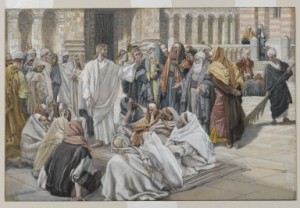 What kind of spiritual danger or harm should we avoid at all costs? Jesus used the illustration of a strong man whose house and possessions were kept secure. How could such a person be overtaken and robbed of his goods except by someone who is stronger than himself? Satan, who is our foe and the arch-enemy of God, is stronger than us. Unless we are clothed in God’s strength, we cannot withstand Satan with our own human strength. What does Satan wish to take from us – our faith and confidence in God and our allegiance to follow God’s law. Satan is a rebel and a liar. Satan can only have power or dominion over us if we listen to his lies and succumb to his will which is contrary to the will of God. Jesus makes it clear that there are no neutral parties in this world. We are either for Jesus or against him, for the kingdom of God or against it. There are two kingdoms in opposition to one another – the kingdom of God’s light and truth and the kingdom of darkness and deception under the rule of Satan. If we disobey God’s word, we open to door to the power of sin and Satan’s influence in our lives. If we want to live in true freedom from the power of sin and Satan, then our “house” – our mind and heart and whatever we allow to control our appetites and desires – must be occupied and ruled by Jesus Christ where he is enthroned as Lord and Savior. Do you know the peace and security of a life submitted to God and to his word?
What kind of spiritual danger or harm should we avoid at all costs? Jesus used the illustration of a strong man whose house and possessions were kept secure. How could such a person be overtaken and robbed of his goods except by someone who is stronger than himself? Satan, who is our foe and the arch-enemy of God, is stronger than us. Unless we are clothed in God’s strength, we cannot withstand Satan with our own human strength. What does Satan wish to take from us – our faith and confidence in God and our allegiance to follow God’s law. Satan is a rebel and a liar. Satan can only have power or dominion over us if we listen to his lies and succumb to his will which is contrary to the will of God. Jesus makes it clear that there are no neutral parties in this world. We are either for Jesus or against him, for the kingdom of God or against it. There are two kingdoms in opposition to one another – the kingdom of God’s light and truth and the kingdom of darkness and deception under the rule of Satan. If we disobey God’s word, we open to door to the power of sin and Satan’s influence in our lives. If we want to live in true freedom from the power of sin and Satan, then our “house” – our mind and heart and whatever we allow to control our appetites and desires – must be occupied and ruled by Jesus Christ where he is enthroned as Lord and Savior. Do you know the peace and security of a life submitted to God and to his word?
What is the basis of our hope and confidence in God? Through Jesus’ death on the cross and his victory over the grave when he rose again on the third day, Satan has been defeated and death has been overcome. We now share in Christ’s victory over sin and Satan and receive adoption as God’s sons and daughters. Through the gift of the Holy Spirit, the Lord enables us to live a new life of love and freedom from slavery to sin. The Lord Jesus is our refuge and strength because he makes his home with us (John 15:4) and gives us the power and help of the Holy Spirit. Do you take refuge in the Lord and allow him to be the Ruler of your life?
“Lord Jesus, you are my hope and salvation. Be the ruler of my heart and the master of my home. May there be nothing in my life that is not under your lordship.”
for the full reflection visit : Daily Reading and Meditation
Tags: blasphemy against the holy spirit, catholic, catholic podcast, catholic prayer, cathollc spirituality, cyril of alexandria, don schwager, evil spirits, gospel of mark, Jesus, jesus christ, Lord Jesus, prince of demons, public ministry, Satan cast out Satan
This entry was posted on Monday, January 24th, 2011 at 8:43 am
You can follow any responses to this entry through the RSS 2.0 feed.
Episode 1 – Regnum Novum: Bringing forth the New Evangelization through Catholic Social Teaching with Omar Guiterrez – Introduction and Value # 1 – Jesus Christ
– Introduction and Value # 1 – Jesus Christ
Discerning Hearts is blessed to present Omar F. A. Guiterrez, M.A. , Special Assistant  to Archbishop George Lucas of the Archdiocese of Omaha, in a groundbreaking series which breaks open the heart of Catholic Social Doctrine.
[powerpress]
We encourage you to visit “Regnum Novum – A New Kingdom: AÂ Revolution” Omar Guiterrez’s blog site
 We live at a very special time. The confluence of many things has brought forth the clear need to be able to articulate the Social Teaching of the Catholic Church in a way that is accessible and applicable. This is not to be an effort where high-minded theories are to be bandied about. Rather, this is a time of opportunity wherein we can apply the Social Doctrine to the concrete so as to bring about a New Kingdom, a Revolution. – Omar G. from Regnum Novum
We live at a very special time. The confluence of many things has brought forth the clear need to be able to articulate the Social Teaching of the Catholic Church in a way that is accessible and applicable. This is not to be an effort where high-minded theories are to be bandied about. Rather, this is a time of opportunity wherein we can apply the Social Doctrine to the concrete so as to bring about a New Kingdom, a Revolution. – Omar G. from Regnum Novum
From episode … 1.     Jesus Christ
You may not believe how many advocates of social justice are only too ready to chuck Jesus out the window in order to get you to buy their plan. One such program of which I’m familiar actually includes materials that deny the divinity of Christ, several times, and deny the salvific work of the cross. As Pope Paul VI and Pope Benedict XVI have said, the Social Doctrine is evangelization. If it is not rooted in the truth, then it can be manipulated to mean whatever one wants it to mean. The truth is quite simply, Jesus Christ who, as Gaudium et spes states, reveals man to himself. The Social Doctrine and the work of charity must stem from an intimate knowledge of Jesus Christ so that they might serve the whole person and point back to Christ.
Also visit Omar’s “Discerning Hearts” page Catholic Social Teaching 101
Tags: catholic, catholic podcast, catholic prayer, catholic social doctrine, catholic social justice, catholic social teaching, cathollc spirituality, jesus christ, new evangelization, Omar Guiterrez, social doctrine, truth, work
This entry was posted on Friday, November 12th, 2010 at 4:39 pm
You can follow any responses to this entry through the RSS 2.0 feed.

